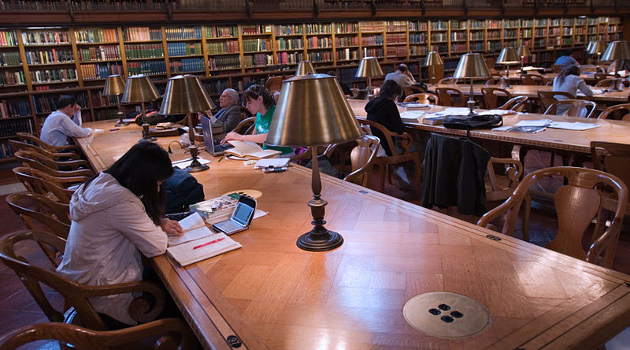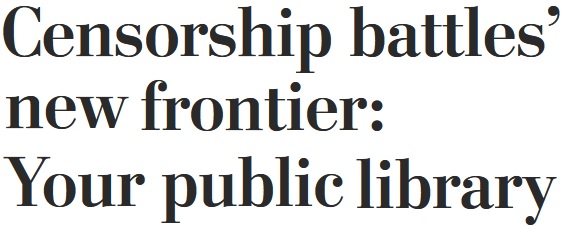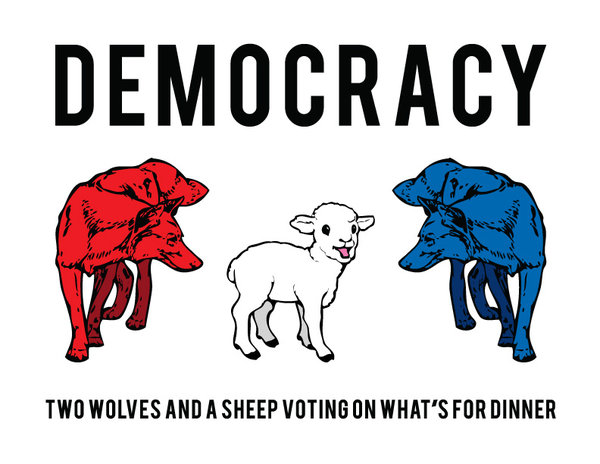In my libertarian fantasy world, schools and libraries would be private institutions, which means market forces would determine which books would be available.
This would mean plenty of diversity.
Private schools in rural Oklahoma presumably would opt for content that reflects traditional values, for example, while private libraries in San Francisco would be more likely to feature salacious content.
But there also would be entrepreneurs who would cater to the needs and interests of left-wingers in Oklahoma and right-wingers in San Francisco.
The bottom line is that there’s no need for a one-sized-fits-all approach if a market is allowed to operate.
All that sounds nice, but my libertarian fantasy world doesn’t exist (even though it already has an anthem).
In the real world, we have government schools and government libraries. So what should the rules be for which books get selected?
As you might imagine this gets very contentious.Valerie Strauss and Lindsey Bever have a story in the Washington Post about a battle in Florida over what math books to use.
Florida said it has rejected a pile of math textbooks submitted by publishers in part because they “contained prohibited subjects,” including critical race theory. The Florida Department of Education announced…41 percent of the submitted textbooks were rejected — most of them in elementary school. …“It seems that some publishers attempted to slap a coat of paint on an old house built on the foundation of Common Core, and indoctrinating concepts like race essentialism, especially, bizarrely, for elementary school students,” Florida Gov. Ron DeSantis (R) was quoted as saying in the announcement.
And a report by Annie Gowen in the Washington Post examines the fight over which books should be in public libraries.
…a growing number of communities across America where conservatives have mounted challenges to books and other content related to race, sex, gender and other subjects they deem inappropriate. A movement that started in schools has rapidly expanded to public libraries, accounting for 37 percent of book challenges last year, according to the American Library Association. …Gov. Greg Abbott (R) jumped into the fray, calling for an investigation of “pornography” in school libraries. …challengers are being assisted by growing national networks such as the parental rights group Moms for Liberty or spurred on by conservative public policy organizations like Heritage Action for America, the ALA has said.
For what it’s worth, I don’t think libertarians have a dog in this fight.
We viscerally oppose government-mandated censorship, of course, but that’s not what is being debated.
The fight is not over which books to ban. It’s about which books to buy.
And since schools and libraries obviously don’t have the ability to purchase every book ever written, somebody will need the authority to choose.
- Should local librarians and local principals have that authority?
- Should local and state elected officials have that authority?
- Should politicians and bureaucrats in D.C. have that authority?
The worst outcome is allowing the crowd in Washington to have any power. That leads to one-size-fits-all and it is a recipe for endless conflict.
Moreover, the federal government has a terrible track record, especially with regards to education. And I can’t imagine the folks in D.C. would do any better if they got involved with libraries.
So we are left with options #1 and #2.
But that’s somewhat misleading because local politicians already have a lot of power over which principals and librarians get hired. They may delegate that authority, to be sure, but they have the ultimate power.
Indeed, the two stories cited above are about citizens pushing elected officials to make certain choices.
That’s democracy in action, for better or worse.
P.S. Libertarians favor democracy, but we very much want to limit the size and scope of government. In other words, for everything other than genuine “public goods,” we prefer markets over majoritarianism.
P.P.S. I don’t want to ban any book, but I definitely would be happy if fewer schools and libraries chose to buy Howard Zinn’s inaccurate book on American history.
———
Image credit: Jorge Royan | CC BY-SA 3.0.




